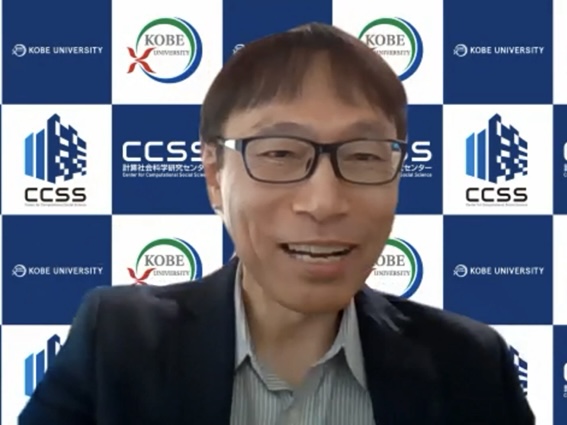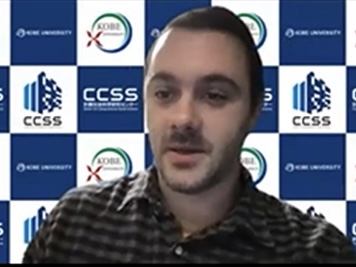CCSS School on Computational Social Science: Agent-Based Models (ABM) in Economics
開催報告
計算社会科学研究センターは、2023年1月20日(金)に、オンライン開催にて"CCSS School on Computational Social Science: Agent-Based Models (ABM) in Economics"を開催しました。
4回目となる今回のCCSS School on Computational Social Scienceは、経済学におけるエージェント・ベース・モデルに焦点を当て、国内外からこの分野で著名な研究者7名が講演を行いました。当センターのシャディ・サラマ助手の司会で幕を開け、今回のCCSS Schoolの開始に先立ち、主催である計算社会科学研究センターの上東貴志センター長が開会のあいさつを行いました。2018年に設置され当センターの紹介や、同じく2018年に、上東センター長がEditor-in-ChiefとしてSpringerから刊行された、Journal of Computational Social Scienceについて紹介がありました。 また第一報告者であるCorrado DI GUILMI氏との共同研究について触れ、今後計算社会科学がマクロ経済学に今まで以上に受け入れられることを願っていると述べました。
 Shady SALAMA 助手
Shady SALAMA 助手
(計算社会科学研究センター)
 上東 貴志 教授
上東 貴志 教授
(計算社会科学研究センター長)
セッション1では、3名の研究者による研究報告がなされました。第一報告者は、Corrado DI GUILMI氏(豪・シドニー工科大学/計算社会科学研究センター 招へい研究者)で"Introduction to ABM"というタイトルで、講演を行いました。続いて、井上寛康氏(兵庫県立大学)が"Agent Based Model on Actual Supply-chain Network"というタイトルで、またDavid GOLDBAUM氏(豪・シドニー工科大学)が、"Deep Neural Networks in an ABM Virtual Experiment"というタイトルで講演を行いました。
 Corrado DI GUILIMI氏
Corrado DI GUILIMI氏
(豪・シドニー工科大学/
計算社会科学研究センター 招へい研究者)
 井上 寛康 氏
井上 寛康 氏
(兵庫県立大学)
 David GOLDBAUM 氏
David GOLDBAUM 氏
(豪・シドニー工科大学)
セッション2は、当センターのRomic IVAN特命助教の司会でスタートしました。4名の研究者による研究報告があり、Thomas LUX 氏(独・キール大学)による"Approximate Bayesian Inference for Agent-Based Models in Economics: A Case Study"、Leonardo BARGIGLI氏(伊・フィレンツェ大学)による"An Introduction to the Frequentist Approach to ABM Estimation"、Annarita COLASANTE氏(伊・ローマ・ラ・サピエンツァ大学)による"Experiments and ABM"、Alberto RUSSO氏(西・ジャウメI世大学)による"Inequality and Monetary Policy with ABM"というタイトルで報告がありました。各講演のあとには、質疑応答の時間が設けられ、聴講者からの質問や意見に対して、活発な意見交換が行われました。
 Romic IVAN 特命助教
Romic IVAN 特命助教
(計算社会科学研究センター)
 Thomas LUX 氏
Thomas LUX 氏
(独・キール大学)
 Leonardo BARGIGLI 氏
Leonardo BARGIGLI 氏
(伊・フィレンツェ大学)
 AnnaritaCOLASANTE 氏
AnnaritaCOLASANTE 氏
(伊・ローマ・ラ・サピエンツァ大学)
 Alberto RUSSO 氏
Alberto RUSSO 氏
(西・ジャウメI世大学)
 柴本 昌彦 教授
柴本 昌彦 教授
(計算社会科学研究センター)
最後に、当センターの柴本昌彦教授より、閉会のあいさつがありました。あいさつの中では、すべての講演内容・研究のクォリティの高さを称え、エージェント・ベース・モデルの活用が経済学においていかに有効であるかということが分かったと述べました。
今回のCCSS Schoolの講演の様子は、 神戸大学計算社会科学研究センター(CCSS) YouTube公式アカウントにて公開予定です。
Program
CCSS School on Computational Social Science: Agent-Based Models (ABM) in Economics
神戸大学計算社会科学研究センタ主催、RIEBセミナー/科研基盤研究(S)「包括的な金融・財政政策のリスクマネジメント:金融危機から国際関係・災害リスクまで」共催
Hosted by Center for Computational Social Science of Kobe University, Jointly Supported by RIEB Seminar / Grant-in-Aid for Scientific Research (S) #20H05633
| 日時 | 2023年1月20日(金)15:00 ~ 20:10 Friday, January 20, 2023, 3:00pm - 8:10pm |
|---|---|
| 会場 | Zoomによるオンライン開催 Online Seminar by Zoom |
| 対象 Inteded Audience |
教員、院生、および同等の知識をお持ちの方 Faculty, Graduate Students, and People with Equivalent Knowledge |
| 使用言語 Language |
英語 English |
Presentation: 30 Minutes
Q&A: 10 Minutes
15:00~15:10 開会挨拶 / Opening Remarks
- Takashi KAMIHIGASHI(Director, Center for Computational Social Science, Kobe University)
Session 1
15:10~15:50
- 論題
Topic - Introduction to ABM
- 報告者
Presenter - Corrado DI GUILMI (Economics Discipline Group, University of Technology Sydney)
- 概要
Abstract - The talk will provide a broad overview of agent-based modeling, from its theoretical foundations, with particular focus on complexity, to the applied aspects of computer coding. Agent-based modeling is rooted in complex system theory, implying a fundamentally different approach with respect to the reductionism that underpins mainstream economic modeling. The application of complexity in economics faces methodological issues that most recent theoretical developments have attempted to address.
15:50~16:30
- 論題
Topic - Agent Based Model on Actual Supply-chain Network
- 報告者
Presenter - Hiroyasu INOUE (Graduate School of Information Science, University of Hyogo)
- 概要
Abstract - Although supply chain disruption is a threat for our economy and society, it is almost unpredictable. The reason of the unpredictability comes from the complexity of the supply chain: products/services have been highly developed and a lot of firms are involed into them. This study focuses on actual supply chains, or supplier--customer networks of firms and applies an agent-based model to the actual supply chains of nearly one million firms and five million relationships in Japan to examine how production losses caused by disasters and pandemics. We estimate the economic losses of the 2011 Great East Japan earthquake and employ the same model to predict the loss of the Nankai earthquake, a mega earthquake predicted to hit major industrial cities in Japan in the near future. In addition, we replicate the economic behavior of the 1st wave of the pandemic in 2020.
16:30~17:10
- 論題
Topic - Deep Neural Networks in an ABM Virtual Experiment
- 報告者
Presenter - David GOLDBAUM (Economics Discipline Group, University of Technology Sydney)
- 概要
Abstract - We use machine learning to model subject decisions in an experiment based on a dynamic game. In this game, players appropriately use prior experiences to inform current decisions. A structural empirical model provides insight into how decisions are informed from prior experiences, but we determine the model to be insufficiently rich to capture decisions well enough to then conduct simulations. Machine learning achieve substantial gains in performance. The role of interactions in determining strategy lends itself to analysis with agent-based modeling. We use the estimated neural network model to run counterfactual virtual simulations that provide information on how well the populations played the game.
17:10~17:30 休憩 Short Break
Session 2
17:30~18:10
- 論題
Topic - Approximate Bayesian Inference for Agent-Based Models in Economics: A Case Study
- 報告者
Presenter - Thomas LUX (Faculty of Business, Economics and Social Science, Christian-Albrechts-Universität zu Kiel)
- 概要
Abstract - Estimation of agent-based models in economics and finance confronts researchers with a number of challenges. Typically, the complex structures of such models do not allow to derive closed-form likelihood functions so that either numerical approximations to the likelihood or moment-based estimators have to be used for parameter inference. However, all these approaches suffer from extremely high computational demands as they typically work with simulations (of the agent-based model) embedded in (Monte Carlo) simulations conducted for the purpose of parameter identification. One approach that is very generally applicable and that has the potential of alleviating the computational burden is Approximate Bayesian Computation (ABC).While popular in other areas of agent-based modelling, it seems not to have been used so far in economics and finance. This paper provides an introduction to this methodology and demonstrates its potential with the example of a well-studied model of speculative dynamics. As it turns out, ABC appears to make more efficient use of moment-based information than frequentist SMM (Simulated Method of Moments), and it can be used for sample sizes of an order far beyond the reach of numerical likelihood methods.
18:10~18:50
- 論題
Topic - An Introduction to the Frequentist Approach to ABM Estimation
- 報告者
Presenter - Leonardo BARGIGLI (Department of Economics and Management, University of Florence)
- 概要
Abstract - In the presentation, first of all, I will try to motivate the opportunity to proceed with the estimation of agent-based models. Then I will focus on various problems related to the frequentist estimation of ABMs. Among these, the main ones concern the computational trade-offs of a frequentist approach based on simulations and the optimal design of the latter; the sensitivity analysis of agent-based models and the identification of their parameters; the approximation techniques which can reduce the computational burden of the estimation.
18:50~19:30
- 論題
Topic - Experiments and ABM
- 報告者
Presenter - Annarita COLASANTE (Università degli studi di Roma Unitelma Sapienza)
- 概要
Abstract - Experimental methodology is spreading in the last decades since it is an effective way to collect data and observe individual behaviors. Agent Based Modeling is increasingly been used to model macro phenomena by using a bottom up approach. These two methodologies are complementary: on the one hand, results collected by experiments are useful to identify micro behavior that could be then implemented for the ABM microfundation; on the other hand, results from ABM may be deployed to validate experimental results. The presentation, after a brief introduction about experimental methodology, aims at presenting how experimental data could be implemented to both calibrate and validate ABM.
19:30~20:10
- 論題
Topic - Inequality and Monetary Policy with ABM
- 報告者
Presenter - Alberto RUSSO (Department of Economics, Universitat Jaume I)
- 概要
Abstract - During the last two decades, there has been a blossoming of agent-based applications to macroeconomic issues. There is a variety of macro ABMs, from simple ones to large-scale multi-country models. This approach represents an alternative to DSGE models for both policy analysis and forecasting. While large-scale calibrated models could be required for an accurate forecasting, small-scale models are very useful for reproducing relevant stylized facts as well as for policy analysis. We design a minimal macro ABM to study how income inequality affects monetary policy through the inequality-household debt channel. We find that when inequality meets financial liberalization, a leaning against-the-wind strategy can preserve financial stability at the cost of high unemployment, whereas an accommodative strategy, i.e. lowering the policy rate, can dampen the fall of aggregate demand at the cost of larger financial leverage (as under the 'Greenspan put'). We conclude that inequality may constrain the central bank, even when it is not explicitly targeted.
20:10~ 閉会挨拶 / Closing Remarks
- Masahiko SHIBAMOTO (Center for Computational Social Science, Kobe University)
